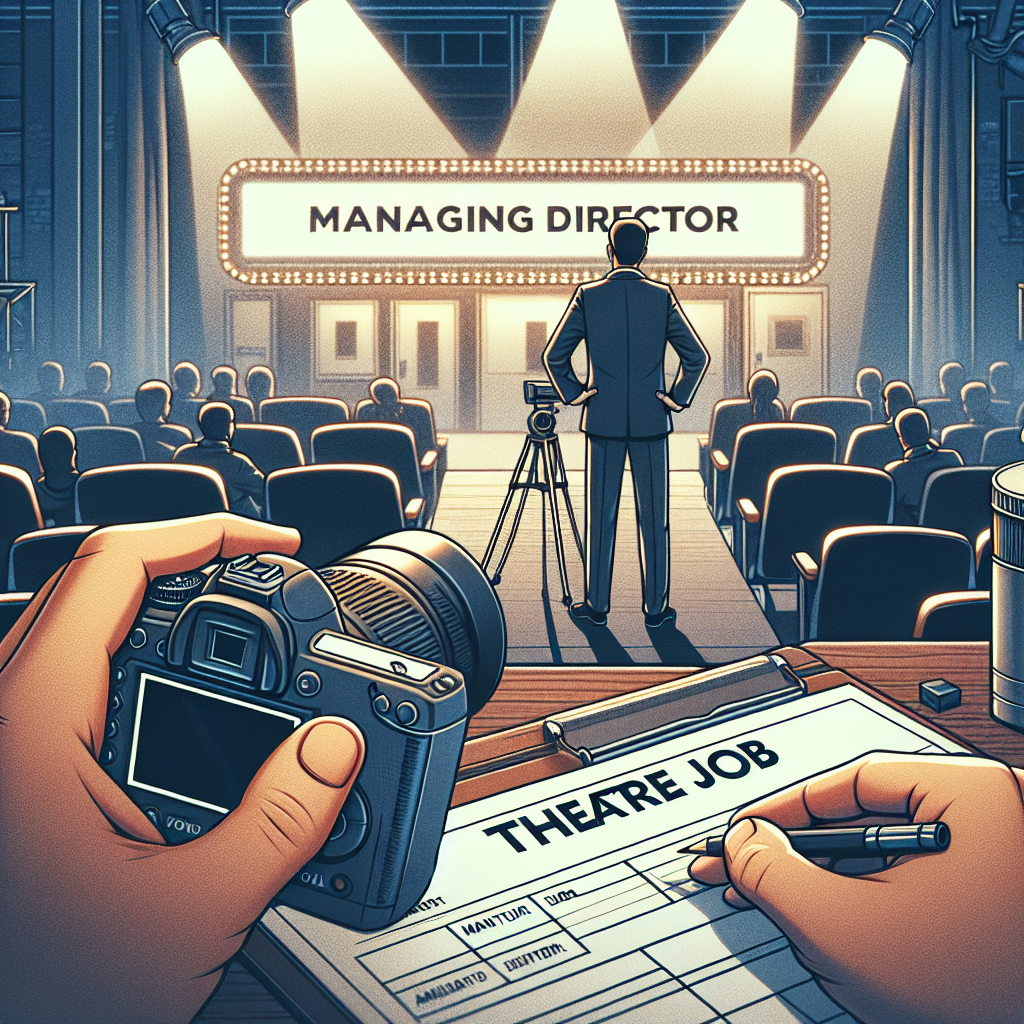Responsibilities of a Managing Director in Theatre
A managing director in the theatre industry plays a crucial role in the overall success of a theatre company. This position requires a unique set of skills and responsibilities that are essential for the smooth operation of the organization. In this article, we will explore the various responsibilities of a managing director in theatre and the impact they have on the company’s success. One of the primary responsibilities of a managing director in theatre is to oversee the financial aspects of the organization. This includes creating and managing budgets, monitoring expenses, and ensuring that the company operates within its financial means. The managing director must also work closely with the finance team to develop financial strategies and make informed decisions regarding funding and investments. In addition to financial management, a managing director is also responsible for developing and implementing strategic plans for the theatre company. This involves setting goals and objectives, identifying opportunities for growth, and creating strategies to achieve them. The managing director must have a deep understanding of the theatre industry and be able to anticipate trends and changes in the market to stay ahead of the competition. Another crucial responsibility of a managing director in theatre is to build and maintain relationships with stakeholders. This includes working closely with the board of directors, donors, sponsors, and government agencies to ensure the company’s interests are represented and supported. The managing director must also cultivate relationships with artists, directors, and other industry professionals to attract top talent and create successful productions. Furthermore, a managing director is responsible for overseeing the day-to-day operations of the theatre company. This includes managing staff, hiring and training employees, and ensuring that all departments are working together efficiently. The managing director must also have excellent communication skills to effectively convey the company’s vision and goals to the entire team. Additionally, a managing director in theatre is responsible for marketing and promoting the company’s productions. This involves developing marketing strategies, coordinating advertising campaigns, and working with the creative team to create compelling promotional materials. The managing director must also have a strong understanding of audience demographics and preferences to attract and retain a loyal customer base. Furthermore, a managing director is responsible for ensuring that the theatre company complies with all legal and regulatory requirements. This includes obtaining necessary permits and licenses, adhering to labor laws, and maintaining a safe and inclusive working environment. The managing director must also stay informed about industry regulations and changes to ensure the company remains in compliance. In conclusion, the responsibilities of a managing director in theatre are diverse and demanding. From financial management to strategic planning, relationship building to day-to-day operations, and marketing to legal compliance, the managing director plays a vital role in the success of a theatre company. It requires a unique set of skills, including financial acumen, leadership abilities, and a deep understanding of the theatre industry. With their expertise and dedication, managing directors contribute significantly to the growth and prosperity of theatre companies.Essential Skills and Qualifications for a Managing Director in Theatre
Essential Skills and Qualifications for a Managing Director in Theatre A managing director in the theatre industry plays a crucial role in the overall success of a theatre company. They are responsible for overseeing the day-to-day operations, managing budgets, and ensuring the smooth running of productions. To excel in this position, there are several essential skills and qualifications that a managing director should possess. First and foremost, a managing director in theatre must have a strong background in business and finance. They need to be able to effectively manage budgets, negotiate contracts, and make strategic financial decisions. This requires a solid understanding of financial management principles and the ability to analyze financial data. Additionally, a managing director should have experience in fundraising and securing sponsorships to support the theatre’s operations. In addition to financial acumen, a managing director should also possess excellent leadership and management skills. They need to be able to effectively lead a team of staff members and ensure that everyone is working towards a common goal. This requires strong communication and interpersonal skills, as well as the ability to motivate and inspire others. A managing director should also be able to delegate tasks and manage conflicts that may arise within the organization. Furthermore, a managing director in theatre should have a deep understanding and appreciation for the arts. They should have a passion for theatre and a strong knowledge of the industry. This includes staying up-to-date with current trends and developments in the theatre world, as well as having a good understanding of the creative process. This knowledge and passion will not only help the managing director make informed decisions but also allow them to effectively communicate with artists and creative teams. Another essential skill for a managing director in theatre is the ability to think strategically and make long-term plans. They need to be able to set goals for the theatre company and develop strategies to achieve them. This requires a strong understanding of the theatre industry, as well as the ability to anticipate and adapt to changes in the market. A managing director should also have strong problem-solving skills and be able to make quick and effective decisions when faced with challenges. Lastly, a managing director in theatre should possess strong organizational and time management skills. They need to be able to juggle multiple tasks and prioritize their workload effectively. This includes managing schedules, coordinating productions, and overseeing administrative tasks. A managing director should also be detail-oriented and have the ability to work under pressure and meet deadlines. In conclusion, a managing director in theatre requires a unique set of skills and qualifications to excel in their role. They need to have a strong background in business and finance, excellent leadership and management skills, a deep understanding and appreciation for the arts, the ability to think strategically, and strong organizational and time management skills. By possessing these essential skills and qualifications, a managing director can effectively lead a theatre company and contribute to its success.Challenges Faced by Managing Directors in Theatre

Challenges Faced by Managing Directors in Theatre Managing directors in the theatre industry face a unique set of challenges that require a combination of business acumen and artistic understanding. From financial constraints to artistic conflicts, these professionals must navigate a complex landscape to ensure the success of their organizations. In this article, we will explore some of the key challenges faced by managing directors in theatre and how they can overcome them. One of the most significant challenges for managing directors in theatre is securing funding. Theatre productions require substantial financial resources, including the cost of hiring actors, building sets, and marketing the show. However, securing funding can be a daunting task, especially in an industry where government support and corporate sponsorships are becoming increasingly scarce. Managing directors must be adept at seeking out alternative sources of funding, such as grants, donations, and partnerships with local businesses. They must also be skilled at budgeting and financial management to ensure that resources are allocated efficiently. Another challenge faced by managing directors is managing artistic conflicts. Theatre is a collaborative art form, and disagreements between directors, actors, and designers are not uncommon. Managing directors must act as mediators, finding a balance between artistic vision and practical considerations. They must foster an environment of open communication and collaboration, encouraging all stakeholders to voice their opinions while also ensuring that the production stays on track. This requires strong leadership skills and the ability to make difficult decisions when necessary. In addition to financial and artistic challenges, managing directors in theatre must also navigate the ever-changing landscape of audience preferences. With the rise of digital media and streaming platforms, traditional theatre faces stiff competition for audience attention. Managing directors must stay abreast of current trends and adapt their programming to attract and retain audiences. This may involve incorporating new technologies, exploring innovative storytelling techniques, or collaborating with other art forms. It requires a deep understanding of audience demographics and a willingness to take risks. Furthermore, managing directors must also address the issue of diversity and inclusion in the theatre industry. Historically, theatre has been criticized for its lack of representation, both on and off stage. Managing directors have a responsibility to ensure that their organizations reflect the diversity of the communities they serve. This may involve actively seeking out diverse talent, programming plays that explore different perspectives, and creating a welcoming and inclusive environment for all. It requires a commitment to equity and a willingness to challenge the status quo. In conclusion, managing directors in theatre face a myriad of challenges that require a unique skill set. From securing funding to managing artistic conflicts, navigating audience preferences, and promoting diversity and inclusion, these professionals must be adaptable and resourceful. By staying informed, fostering collaboration, and embracing innovation, managing directors can overcome these challenges and ensure the success and longevity of their organizations. The role of a managing director in theatre is not an easy one, but it is a vital one that contributes to the vibrancy and cultural richness of the theatre industry.






Leave a Reply
You must be logged in to post a comment.